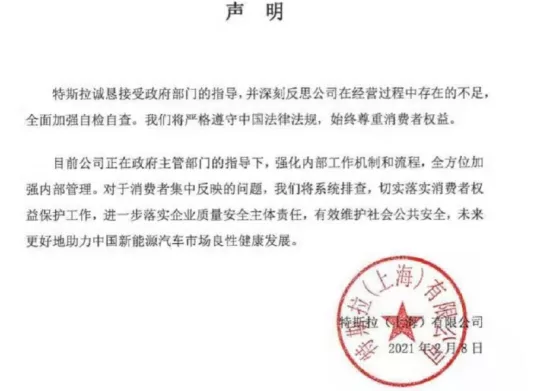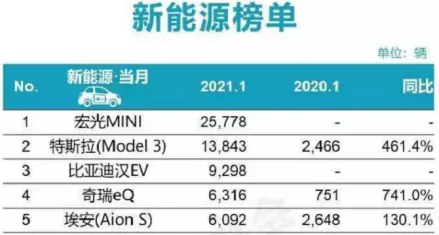Author: Li Yuanyuan from Dian Guan
Once again, Tesla has received “over-standard” attention from regulatory authorities. On February 8th, the State Administration for Market Regulation, the Cyberspace Administration of China, the Ministry of Industry and Information Technology, the Ministry of Transportation, and the Fire and Rescue Bureau of the Emergency Management Department jointly interviewed Tesla on issues such as abnormal acceleration, battery fires, and remote vehicle upgrades reflected by consumers. It is not uncommon for car companies to be interviewed, but it is rare for multiple departments to be interviewed together. In particular, according to the official website of the Cyberspace Administration of China, this is the first time that the Cyberspace Administration has interviewed a car company.
This interview reminded people of the Cyberspace Administration’s predecessor’s action 11 years ago, which was aimed at Google, another American star technology company. Google eventually chose to withdraw from the Chinese market. Tesla made a public statement, “Sincerely accept the guidance of government departments, and deeply reflect on the inadequacies of the company in the operation process, strengthen self-examination and self-correction in an all-round way. We will strictly abide by Chinese laws and regulations and always respect the rights and interests of consumers.”
Currently, Tesla’s hot sales in China have also caused many automatic driving accidents, which has aroused concerns from all parties about its data security. In February 2020, 11 departments including the Cyberspace Administration of China jointly issued the “Smart Car Innovation Development Strategy”, which clearly stated that it is necessary to strengthen the supervision and management of data security for smart cars, improve the management system of data security, strengthen supervision and inspection, and carry out data risk and data export security evaluations.
Tesla’s interview can be regarded as the first case of the Cyberspace Administration of China’s implementation of intelligent data security management. However, at present, the regulatory authorities not only lack specific policies on how to manage intelligent car data, but also may lack ideas.
Tesla’s early exploration of intelligent cars should be a material for regulatory authorities to study policies, and it can also provide inspiration for the subsequent data management of other intelligent cars. If the Cyberspace Administration wields the sword of intelligent car data management, Tesla is currently just a whetstone.
Unprecedented “Joint Interview”
On the eve of the 2021 Spring Festival, February 8th, the news that the State Administration for Market Regulation, the Cyberspace Administration of China, the Ministry of Industry and Information Technology, the Ministry of Transportation, and the Fire and Rescue Bureau of the Emergency Management Department jointly interviewed Tesla became the headline of the automobile industry and quickly caused widespread discussion.
Some people speculate that Tesla was interviewed because it had “shifted blame” to State Grid, referring to the recent incident in which Tesla attributed user charging malfunctions to excessive current supplied by State Grid.
However, upon closer examination of the interviewees, the situation is not simple. When a car company is interviewed, the responsible regulatory authorities are usually the same based on the alleged regulatory violations. But in most cases, one regulatory authority can initiate the interview just fine.In contrast to previous cases involving automakers and Chinese regulatory authorities, Tesla’s summons involves numerous departments, including the Ministry of Industry and Information Technology, the State Administration for Market Regulation, the Cyberspace Administration of China, the Ministry of Transportation, and the Emergency Management Department Fire and Rescue Bureau.
The Cyberspace Administration of China, in particular, is participating, which is unusual. The Cyberspace Administration of China, or CAC, is the office under the Central Leading Group for Cyberspace Affairs, a central body directly under the Communist Party of China. The CAC’s primary job is to guarantee national and Chinese citizens’ cybersecurity and information security.
In recent years, with the rapid development of intelligent cars and self-driving technologies, the CAC’s attention to such technology has increased. In February 2020, the National Development and Reform Commission and the CAC, among other 11 departments, issued the “Intelligent Automobile Innovation Development Strategy,” which clearly states the need to improve data security management, establish a data security management mechanism that covers the entire life cycle of intelligent automobile data, and stipulate the data security protection responsibilities and specific requirements for relevant parties.
The “Strategy” also proposes the construction of a national-level intelligent automobile big data cloud control basic platform. Currently, existing national monitoring platforms, such as the National Big Data Alliance for New Energy Vehicles, have very limited supervision of intelligent connected vehicles, and have not yet covered more in-depth data, such as automatic driving.For foreign-owned car companies such as Tesla, localized production has resulted in nearly 140,000 units sold in China alone in 2020, not including the large number of imported vehicles that have been sold in the country for years without being subject to government platform supervision.
On February 27, 2014, the first meeting of the Central Network Security and Informatization Leading Group pointed out that the “PRISM” incident demonstrated that using domestically-produced software and hardware that is self-controllable is necessary for network information security, and that China should strengthen its focus on network security and information technology development.
However, when the incident happened, China’s new energy vehicles had a relatively low level of intelligence, and the government’s focus on information security concerns was mainly on internet giants like Google and Apple.
Today, as Tesla expands rapidly in China, it is already challenging the regulatory scope of its governing agencies. In the past year, accidents involving Tesla’s self-driving and OTA upgrades have made repeated headlines, and there have been incidents where Tesla has deleted backend data following accidents, prompting media calls for “national supervision of Tesla’s backend data.”
This participation of the Cyberspace Administration of China in summoning Tesla shows that the intelligent car data security issues hidden behind Tesla’s hot sales have attracted the attention of China’s regulatory authorities.
It has been 11 years since the State Council Information Office’s Network Bureau (the predecessor of the Cyberspace Administration of China) criticized another American technology giant, Google, for refusing to comply with Chinese laws and regulations and choosing to withdraw from the Chinese market, while Tesla responded to the summons by issuing a statement on the same day, stating that they “sincerely accept guidance from government departments.”
After all, Tesla has already received significant profits from China’s massive electric vehicle market.
In addition, Tesla’s 2019 report submitted to the U.S. Securities and Exchange Commission (SEC) revealed that the company has signed a 50-year operating lease agreement with the Shanghai government for its factory, and if it fails to fulfill the agreed-upon terms, it will have to return the land and repay losses, including a yearly tax of CNY 2.23 billion from the end of 2023.
As a company closely tied to the Chinese market, Tesla may have no choice but to comply with regulations. However, it remains unknown how Tesla will cooperate with China’s data supervision, and if it can dispel official and public concerns about its threat to national information security.
Moreover, there are currently no publicly available specific policies on how intelligent vehicle regulatory agencies such as the Cyberspace Administration of China will manage intelligent vehicle data. Tesla’s early explorations will provide material for regulatory agencies to shape their strategies for managing intelligent vehicle data and develop concrete rules and regulations.
 Due to the Internet nature of smart cars, regulatory approaches may likely follow those of the Internet industry. For instance, the data generated by smart cars will probably require storage within the country.
Due to the Internet nature of smart cars, regulatory approaches may likely follow those of the Internet industry. For instance, the data generated by smart cars will probably require storage within the country.
The Cybersecurity Law, which has caused headaches for many foreign Internet enterprises, has been implemented since 2016. Article 37 of the law stipulates that:
“The personal information and important data collected and generated during the operation of critical information infrastructure within the territory of the People’s Republic of China shall be stored within the territory. If it is necessary to provide such information overseas for business reasons, a security assessment shall be conducted in accordance with the methods formulated by the competent cyberspace authority under the State Council in conjunction with relevant departments; or in accordance with the provisions of laws and administrative regulations if they have different requirements.”
Smart cars are themselves collectors of personal information and important data, and the “operators of critical information infrastructure,” as defined in the law, could easily be switched to smart car operators—they include Apple, Yahoo, and Google to name a few.
Moreover, the law defines the Internet as “a system that collects, stores, transmits, exchanges, and processes information according to certain rules and procedures using computers or other information terminals and related devices.” Smart cars undoubtedly have these capabilities.
In addition, the viewing permissions for this data should not be solely granted to the smart car manufacturers, especially in the event of a security accident, where consumers and regulatory authorities should have the right to view it. The claim by Tesla accident car owners regarding their data access should be supported.
Aside from data storage and viewing, there are still many regulatory blank spaces concerning data development, commercialization, and other related areas. Since the Tesla conversation, the relevant departments, such as Cyberspace Administration of China (CAC), have a lot of work to do.
Production and after-sales issues trigger concerns
Before the joint conversation with the five departments, Tesla had already caused significant discussion in China regarding production and after-sales issues.
Over the past two weeks, Tesla has repeatedly hit the hot search lists for unprofessionalism such as the blame game for energy consumption of state grid and deflecting the responsibility on female car owner’s weak breaking force. Xinhua News Agency criticized Tesla many times, asserting that the company’s “malicious blame-shifting is unreasonable arrogance towards Chinese consumers.”
The five departments’ conversation with Tesla has pushed criticisms of the company to a new height. Many social media users and industry insiders applaud the criticism levied at the company, saying this is what such relentless behavior deserves. It can be said that both official and public criticism of Tesla has triggered concerns about its production, after-sales, and even catching fire in China.
○ SAMR specifically conversed after-sales issues
Among these issues, poor after-sales service is one of the public’s main criticisms of Tesla.
We analyzed that among the five departments, the State Administration for Market Regulation (SAMR) was likely to focus on conversing about post-sales issues such as the “abnormal acceleration” problem mentioned in their notification.Since last year, there have been several incidents of brake failures with the Tesla Model 3 in China, most of which were attributed to driver error by Tesla. In one such incident, Tesla claimed that weak braking force by the female driver was the cause.
In January 2021, a report released by the National Highway Traffic Safety Administration (NHTSA) in the US showed that they had received 246 complaints of “sudden unintended acceleration” with Tesla, also caused by user error. Following this report, Tesla China executives forwarded it in an attempt to clear the company’s name, but did not address any after-sales service issues.
In addition, in November 2020, the roof of a Tesla Model 3 traveling on the road came off and flew away. Tesla attributed the cause to the fact that the vehicle had been repaired by a third-party authorized sheet metal institution. In January 2020, the inverter of a Model 3 burned out while being charged at a State Grid charging station. Tesla initially claimed that it was due to an instantaneous current overload.
After State Grid’s response, Tesla clarified its position and apologized, but Chinese netizens were not convinced, and Tesla’s arrogance and buck-passing became part of its public image.
The consistency issues with Tesla’s products should be addressed by the Ministry of Industry and Information Technology (MIIT). This is already the second time MIIT has called on Tesla to address product consistency issues.
In March 2020, MIIT summoned Tesla to a meeting to discuss irregularities in the installation of HW 2.5 components in some Model 3 vehicles. Tesla was ordered to immediately rectify the relevant provisions of the “Regulations for the Production and Access Management of Road Motor Vehicles,” fulfill its enterprise main responsibility, and ensure production consistency and product quality safety.
However, Tesla did not seem to take this meeting seriously enough.
In February 2021, Tesla filed a recall plan with the State Administration for Market Regulation to recall some imported Model S and Model X electric vehicles due to suspension safety issues.
However, in a letter to the NHTSA, Tesla denied that there was a safety problem with its vehicle suspension, claiming that the component damage was not a quality issue, but rather due to some Chinese drivers’ misuse (driver abuse). Tesla emphasized that it could only choose to voluntarily recall or else bear a heavy administrative burden.
Shortly thereafter, Xinhua News Agency published an article entitled “Insight: Tesla’s malicious buck-passing is unreasonable arrogance towards Chinese consumers”, criticizing Tesla for “acknowledging recalls in China and buck-passing in the United States.”
Almost at the same time, Tesla CEO Musk admitted in an interview with American media that there were indeed quality control issues during the company’s production capacity ramp-up period and suggested that “if you want to buy a Tesla, either buy it from the beginning or wait until production stabilizes.”
The Emergency Management Department and Fire Rescue Bureau of the Ministry of Emergency Management are responsible for firefighting and other emergency rescue work, and are also one of the regulatory agencies for the safety of new energy vehicles.Clearly, the main focus of the fire department’s joint talks with Tesla was the multiple fire incidents involving Tesla vehicles. The most recent one occurred on January 9th, when a Tesla Model 3 caught fire in an underground garage in a residential area in Shanghai.
However, it’s worth mentioning that, unlike the Cyberspace Administration of China (CAC), the fire department’s previous joint talks were mostly with shopping malls, supermarkets, residential communities, and logistics parks, and not many were with car manufacturers.
The issues discussed during the transport ministry’s joint talks with Tesla would likely overlap with those of the Ministry of Industry and Information Technology (MIIT) and the CAC, involving OTA upgrades, among other topics.
Still Selling Well
It’s worth noting that the widespread criticism from both official and unofficial sources hasn’t affected Tesla’s sales performance.
According to data from the China Passenger Car Association, Tesla sold nearly 14,000 Model 3 units in January 2021, a year-on-year increase of 4.6 times. Considering Tesla’s already struggling production capacity and the fact that some of its capacity is assigned to the new Model Y, this is an impressive feat.

However, as a showcase of China’s openness in the new energy vehicle field, Tesla has enjoyed super preferential policies from both the national and Shanghai governments.
Now that it has received “special treatment” from the five government agencies, if it doesn’t take concrete actions to “comply with regulations” instead of just paying lip service, it’s uncertain whether Tesla can maintain its position as the king of electric vehicles.
This article is a translation by ChatGPT of a Chinese report from 42HOW. If you have any questions about it, please email bd@42how.com.
